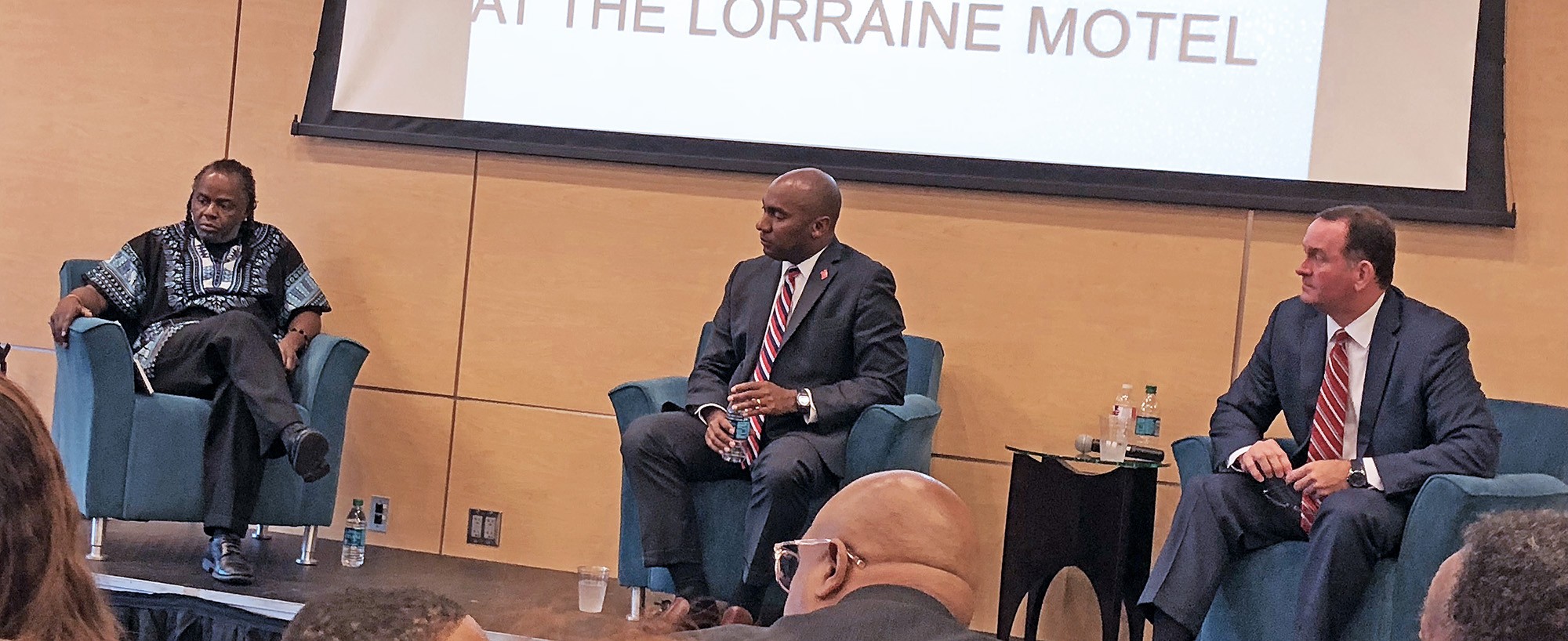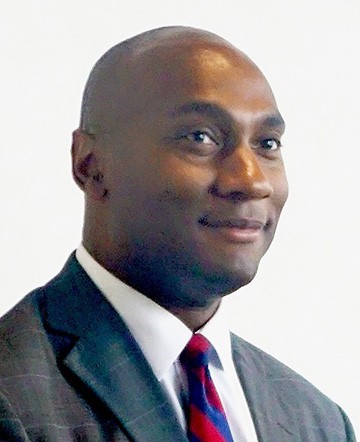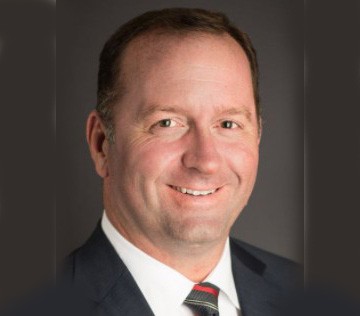 JB
JB
Moderator Ajanaku (l) and debaters Harris and Lenoir at Civil Rights Museum
So how did Tuesday night’s debate between candidates for Shelby County mayor go? The answer is: Well enough for both Trustee David Lenoir, the Republican nominee, and state Senator Lee Harris, the Democratic nominee, to claim victory for themselves. Others may have seen it one way or the other, depending on their partisanship. And it was theoretically possible to call it a draw.
In the Beginning: The debate kicked off, as is customary, with brief opening statements. Harris went first, maintaining, as he has before, that “poverty” is the biggest issue of the campaign, elaborating that county government had achieved “not enough progress fast enough.” Given that this was an NAACP-sponsored debate, in the National Civil Rights Museum, Harris’ contention was well attuned to his audience — much more so than when he named poverty and “segregation” as predominant issues in his June 13th debate with Lenoir before a predominantly white, middle-class group of Kiwanians.
Lenoir wasted no time dealing with the elephant in the room, which was the fact, obvious to attendees, that the originally scheduled moderator, veteran journalist Wendi Thomas, had been replaced by the Tri-State Defender editor Karanja Ajanaku. It was well known that Lenoir had originally balked at taking part if Thomas participated, on account of what he said (though he did not specifically identify) were Thomas’ “biased public statements” on social media.
The NAACP then planned to have the debate with only Harris in attendance, before Thomas offered to step aside. Lenoir then changed his mind again and agreed to participate. He spun the situation by congratulating the NAACP and the other sponsors for being willing to make the change. Some subdued murmuring in the audience suggested the explanation was not a crowd-pleaser.
Aside from its underscoring what had been a Lenoir power play, the basic fact of this opening exchange was that it defined who was home and who was having to play an away game. Advantage Harris.
Definition of Aims: Early on, without stirring much reaction one way or another, Lenoir espoused his usual goals of “great schools, great jobs, and safe streets,” hailing the prospect of “growing the economy and building a bigger pot” for the sake of “women and minorities” and boasting his actions as Trustee in making large deposits at the black-owned Tri-State Bank.
 JB
JB
State Senator Lee Harris
Harris responded that “we’ve got to be watchful of the language,” that “growth is important,” but “sometimes at the expense of the folks at the bottom.” In other words, said Harris, “growth still means that we will continue with inequality. Those at the top get wealthier, and those at the bottom get a little bit of wealth.”
Both got to make their essential points, with Harris earning a bit of extra applause — both for the faintly incendiary nature of his allegation and in appreciation of its hint of originality. Lenoir would get a chance later on to expound on his “courage” and his purported successes in building up the county treasury for public purposes.
Education: Both candidates stood four-square for improvements in education, with Harris noting that he had endorsements from teachers’ groups and Stand for Children.
Lenoir got to repeat his plan for “an educational liaison” official and received some healthy applause for his plan to allocate capital construction carefully.
Clout in Nashville and Past Public Service: Lenoir boasted his connections in Nashville and his experience as an administrator and made a point of saying that he had “finished every term I was elected to.” That was a not-so-veiled shot at the upwardly mobile Harris, who, critics charge, is always sighting new jobs other than the one he has been elected to.
Harris quickly responded: “I served for three years on the Memphis City Council, and I ran for the state Senate because I was not satisfied with the incumbent [Ophelia Ford], and nobody else would run against her….God bless her heart; she was not doing a good job at that time, and I ran against her because it needed to be done. I’m serving my fourth and final year in the state Senate, and I’m giving up my seat so that new talent can come through door.”
So far, so good, and then Harris delivered the clencher to resounding applause that even forced an admiring smile from Lenoir: “And the problem is not that our politicians do not stay long enough. It is that they stay too long!” Several voices in the crowd mouthed those last two words along with him. Lenoir made an effort to recoup by once again stressing his experience as an administrator vis-a-vis an opponent who had “never run an operation.”
Crime: Harris drew an interesting parallel between the prospect of improved transportation as lever to create opportunities and dampen the prospect of crime. In his turn, Lenoir went for the gold, repeating a charge that had worked for him three times in their earlier Kiwanis debate, and had gone un-rebutted then by Harris. “My opponent is soft on violent crimes. He voted against a bill in Nashville that would toughen the sentencing for criminals with guns.” Further: “He wrote legislation that would reverse Representative Lois DeBerry’s drugs-around-our-schools bill.”
Harris replied, “It’s easy to criticize my record of leadership because I have a record of leadership. I have been on the forefront … on every issue we have talked about so far, for the last seven years.” He described himself as being in favor of criminal justice reform and made an effort to characterize the bill that Lenoir had spoken of as being aimed at non-violent offenders who happened to have guns. More important, said Harris, were “the rapists, the murderers — and let’s stop giving these domestic abusers slaps on the wrists.”
It wasn’t perfect, but it was far more effective than had been Harris’ choosing to ignore the charge at the earlier debate. Lenoir would return to the “soft-on-violent-crime” theme and made a point of having the endorsements of the Deputy Sheriffs Association and the Memphis Police Association’s, “because they understand my position on crime, and they understand my opponent’s position, as well.”
Both made the case for the joint city/county Office of ReEntry for ex-offenders, but Lenoir charged that Harris, on the council, had voted against funding a Second Chance program that had similar aims. Both made much of their past cooperation with DeAndre Brown, whose “Lifeline to Success” program had eased ex-felons back into the mainstream of society.
Both candidates also made a point of questioning the credibility of the federal immigration agency I.C.E., Harris going a step further and suggesting the the county’s Public Defender should consider defending undocumented immigrants.
Redirects: Lenoir, in general, had kept pace with Harris in matters that obviously resonated with the audience in the Civil Rights Museum. He stumbled somewhat when, in speaking of the bridge shutdown protest two years ago, he suggested that emergency vehicles had been unable on that occasion to use the blocked span across the Mississippi. That drew shouts of denial from the audience, the one and only time there was heckling of sorts during the debate.

County Trustee David Lenoir
But Lenoir was able to use another question about a notable public controversy to redress a charge that has lingered against him since his appearance with two other Republicans in a GOP primary debate back in April. He and they — County Commissioner Terry Roland and Juvenile court clerk Joy Touliatos — had been asked about the city’s action in arranging the takedown of Confederate statues from parks downtown and the state legislature’s resultant punitive action in withdrawing a $250,000 grant for Memphis’ bicentennial celebrations next year.
Back then, all three Republican candidates had been dubious about the exact manner of the city’s manner of removing the statues (by selling the parks to a non-profit and then providing equipment and personnel to remove the statues from the parks at the non-profit’s request).
Roland, who had spoken first, seemed undisturbed by the state’s punitive attitude. “Until people quit thumbing their nose at Nashville, there’s nothing we an do,” he said, alleging that the city had acted “like a thief in the night.” Touliatos, too, had been accepting of the state’s reaction: “The statues were handled inappropriately…. If you’re going to go against state law, there are going to be repercussions.”
Lenoir, who had spoken second then, just after Roland, addressed the matter this way: ““First of all, I believe in limited government and local control. So in terms of decision-making, it should happen at the local level. I would agree with my colleague [Roland] with the way, specifically on the statues, with the way it occurred, late at night on a Friday night [it was actually a Wednesday night], under the cloak of darkness, it no doubt sent the wrong message — not only to many that lived in Shelby County but also in Nashville. But in terms of how to mitigate that, I believe that things ought to happen on a local level. In many ways we need less of Nashville in Shelby County business. That would be my response on that.”
The Trustee’s statement in April had been somewhat shaded against what the city had done, but technically he had not endorsed the state’s adverse reaction, and just as technically (and, to be sure, modestly) he had gone on record as favoring local prerogatives.
Hence, Lenoir was more or less within his rights to say, on Tuesday night at the Civil Rights Museum, “I’m happy to tackle this one, because local control, local decisions, the decision needs to be made at a local level. It was made at a local level. It was passed unanimously by the City Council. It was a decision that was made, and I’m glad I can clear the record, ‘cause there’s folks out there — it’s politics; I get it; I understand — but you will not find me on the record as saying that I thought it was a state issue. All the lies that are going on out there are just that — they’re lies. It’s a local decision, local control as far as the removal of those statues, and I think that’s the way it should have happened.”
That answer somewhat overstated Lenoir’s position back in April, but it was not inconsistent with it, and Lenoir probably gained from the opportunity to address the matter again, in much the way that Harris had gained from the chance to deal again with Lenoir’s charge about his alleged opposition to an anti-crime control vote in Nashville.